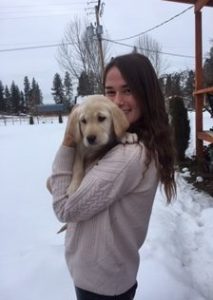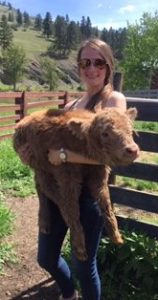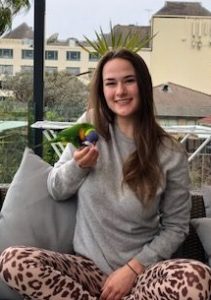Unit One: Meeting Peers, Defining Technical Terms and Peer-Reviewing
Unit one has been a wonderful introduction to ENGL 301 98A. Over the past few weeks, I can confidently say that I am seeing an improvement in my writing, communication, and peer-reviewing techniques. I am looking forward to continuing to improve my skills throughout the term alongside my classmates and Dr. Paterson.
Assignment 1:3 was composed of three parts. Part one consisted of having each student choose a technical term preferably within their field of study and writing three definitions of that term: a parenthetical definition, a sentence definition, and an expanded definition. Part two involved a peer-review of the definitions, team members partnered up to review each other’s work providing feedback and recommendations. I was lucky enough to partner up with Alison Ma from our ENGL 301 class. Part three comprised of editing the original definition according to your peer-reviews suggestions.
I chose to define the term Hydrocephalus. Previously glancing at the word Hydrocephalus in a medical terminology book, I struck an interest to learn more about it. When writing the expanded definition, I chose to use the following strategies: Operating principle, etymology, history, and visual representation. During the peer-review process, Alison suggested I expand on the definition, diagnosis, and cure of Hydrocephalus to meet the operating principle. I would like to thank Alison for making this suggestion as I believe my revised definition now appropriately fits the four expansion strategies that are required for this assignment. When writing about the operating principle, I learned how to articulate medical terms into a non-technical way to allow readers who may not study medical terminology to understand the procedure and diagnostic criteria. The strategy of etymology allowed me to translate Latin and Greek medical terms into English terms.
After reading the peer-reviewed definition provided by Alison, I learned how to critique jargon words used such as cerebrospinal fluid, ventricles, and ventriculojugular shunt with a spring into terms that readers with a non-technical background could understand. Before peer-reviewing Alison’s work, I examined the definition template as a flexible guideline provided by Dr. Paterson. While peer-reviewing my partner’s work, I learned the definition of Purchasing Power Parity. I learned the difference between Purchasing Power Parity and currency exchange which I found fascinating, as I love to travel and often deal a lot with different currencies. During my peer review process, I was able to provide concise, appropriate feedback regarding grammar, citation, and organization. I hope Alison has found my feedback to be beneficial, as I certainly have found hers to be.
Please click on the link below to review my application letter for Unit One.
Unit Two: Best Practices for LinkedIn, Formal Report Proposal, and Peer-Reviewing
Before enrolling in English 301 98A, I had a brief understanding of LinkedIn. I was aware of the rapidly growing social networking site for graduates, employers, business professionals, and research organizations. I enjoyed researching and reviewing the different practices used to create a professional LinkedIn profile. I used techniques that I have found as well as I have used techniques that my peers have mentioned to make my LinkedIn profile standout. The peer review was especially helpful as I was able to revise my profile with the recommendations from an outside perspective. I am thankful that creating a LinkedIn profile was part of this unit’s assignment as I now have a professional LinkedIn profile where I continue to make connections and apply for jobs through many different companies, an opportunity that I have not had prior to creating a LinkedIn profile.
Regarding the report proposal, I have found the process of this assignment to be very tricky. This is my first time writing a report proposal and living in a rural community has provided me with limited resources. I found it challenging to research an appropriate topic. Preparing an outline and a writing schedule will help me complete my formal report in a timely matter. I am going to spend quality time reviewing formal reports and re-reading chapters in the textbook to ensure my formal report meets the requirements. It is going to be a challenge, but I am hopeful with the resources available, I will be able to successfully write a formal report.
I enjoyed reading my partner’s, Kathryn Simone, proposal. She touched on an area that requires improvement for the health of Canadians. In peer reviewing my partner’s work, I learned the risk issues concerned with poor hospital meals. I reviewed cited sources to understand the issue behind the intended proposal and I also very much enjoyed reading what the World Health Organization had to say which was quoted in the report proposal. Peer reviewing assignments allows me to enhance my writing and reading ability. I can pick out errors that I may not be able to see within my writing. I believe my writing and my organization of writing and posting on a blog forum allows me to develop stronger technical writing skills. When I have my work peer-reviewed, I always revise my work accordingly to the appropriate recommendations provided. I appreciate having my work peer-reviewed because it allows me to understand from a different perspective and it provides me with recommendations on my strengths and weaknesses for my writing. I then utilize the skills outlined and incorporate those techniques into my writing. I am not surprised by the outstanding work this class has provided. I enjoy reading what my classmates post on the team forum because everyone has different writing techniques and styles that can influence the reader. I am excited to read the formal reports because each topic is diverse and unique to each student.
Please access the link below to review the Best Practices for LinkedIn.
Unit Two: Best Practices LinkedIn
Unit Three: Complaint and Response Letters, YOU-Attitude, Drafting and Peer-Reviewing of a Formal Report
From the transition to unit two to unit three in ENGL 301, I can confidently express how far I have come in my technical writing skills. In unit three, I learned how to write letters of complaint while providing a respectful tone as well as I have learned how to respond to such letters, with empathy and professionalism.
In reviewing my assignments for unit three, I have noticed my transition from writing the memorandum to Evan Crisp identifying YOU-attitude to the recent peer-review of the formal report draft. I have seen my writing improve by reducing common grammatical errors and limiting the word “it”. I have learned to write and respond professionally while getting the point across in a concise manner and most importantly while using YOU-attitude.
Regarding the formal report, I was struggling at the beginning with finding an appropriate topic and how I was going to proceed with the research process. Over time, completing all required assignments for this course has influenced the writing of my formal report.
I found the writing of the report rewarding because I am very passionate about the chosen topic. Although being passionate about the report doesn’t necessarily mean it was easier, I found the design of creating the report to be challenging. In terms of the research process, this was also a challenge that only seemed to get better after I found the appropriate sources to include. I gathered a ton of primary and secondary sources that I wrote in a new word document and after a couple of weeks of reviewing, I was able to narrow down the top sources that needed to be included. I found the process of researching, writing, and drafting the report to be time-consuming, which was expressed ahead of time.
In writing the report draft, I have learned how to become a better writer by using YOU-attitude, I learned more about the research process, and most of all I learned other people’s opinions who are facing similar struggles as other BC residents who are wanting to apply to veterinary school in Canada. Overall, I have been very impressed with the participants who voluntarily took the time to participate in my survey. The survey results were very rewarding for me.
I can undoubtedly say that the peer-review of the formal report draft was my favourite peer-review assignment. I say this because I had Kathryn Simone as a peer-review partner for the initial formal report proposal and I was able to see how her writing and her research process has transitioned from the proposal to the report draft. Kathryn has chosen to write about a very important topic that can impact individuals. I enjoyed reviewing her work and learning about what the World Health Organization had to say. When peer-reviewing her report, I was able to reflect on the YOU-attitude and I was able to reflect on my recommendations for my report as well. Kathryn has offered some great recommendations that I have incorporated into my formal report draft after the peer-review process.
Despite how challenging unit three was and how many fears I had starting this unit as I was very unfamiliar with writing with YOU-attitude and writing a formal report, I have overcome the nerves and I have developed even stronger technical writing skills that I will use in the future.
Please click on the link to review my formal report draft.
Reflection: Web Folio
The web folio assignment is a major task that combined learned skills, peer-review work, and writing assignments that we have performed throughout the English 301 Technical Writing class. Drafting and reviewing are essential for providing concise professional work. Finalizing the web folio has taken an extensive amount of time, as there is little room for error.
It is rewarding to review previous assignments from units one, two and, three as I can reflect on the work I have done throughout the course. When completing this task, I decided to build my web folio on UBC blogs as I am familiar with this site. Formatting the website to creating new pages is a simple process here. As I am passionate about veterinary medicine, I have decided to build my web folio concerning veterinary medicine. I hope to show former employers my previous work experience, educational qualifications, and most importantly my interpersonal skills.
Creating the web folio took many hours of drafting, organizing, and reflecting. Being able to self-reflect from my initial blog post to my final blog post has led me to feel incredibly proud of the work I have created. Reflecting on my evaluation sheets over the semester has allowed me to showcase my best work.
Self-Assessment
Below is the first blog regarding my course expectations:
In taking this course, I hope to expand my knowledge as well as learn from peers on creating blogs, professional profiles, building resumes, and developing practical writing techniques. This material is new for me as I have never created a blog before, nor have I used a LinkedIn Profile. However, with social media sites such as LinkedIn continuing to be a growing factor in job recruitment, I am very eager to learn how to create a professional network while working with peers. This course is relevant to real-world criteria in the form of writing proposals, emails, abstracts, creating job applications, etc., I am looking forward to developing writing techniques that will advance my professional career. I have two main goals for this course. Firstly, I would like to create a professional resume that stands out to not only employers, but also educators, and universities. Secondly, to develop a professional LinkedIn Profile that outlines my skills, education history, work experience, and travel history to further accommodate my professional career.
Now, after completing the course, I can confidently express that I have a stronger knowledge of creating websites, posting blogs, formatting professional documents such as reports, resumes, and memorandums, as well as, I have seen significant improvement within my technical writing skills. I created a LinkedIn profile, where I was able to incorporate best practices to enhance a professional account. Alongside that, I have a strong application package with enclosed documents such as a resume, cover letter, and request for references which will be used accordingly.
I was extremely nervous about writing the formal report as I have never been a strong researcher or writer. After many weeks of researching, writing, drafting and reviewing, I was successful in creating a well-designed formal report. I am extremely proud of myself to see how far I have come in terms of my writing. In reviewing my first assignments in unit one to my final assignments in unit four, it is rewarding to see how much I have accomplished. I would like to say thank you to Dr. Erika Paterson for providing outstanding feedback to enhance my writing and to learn from the mistakes I have made. The techniques I have learned from English 301 98a will continue to be with me throughout my professional and educational career. The skills I have learned from this class are lifelong.



